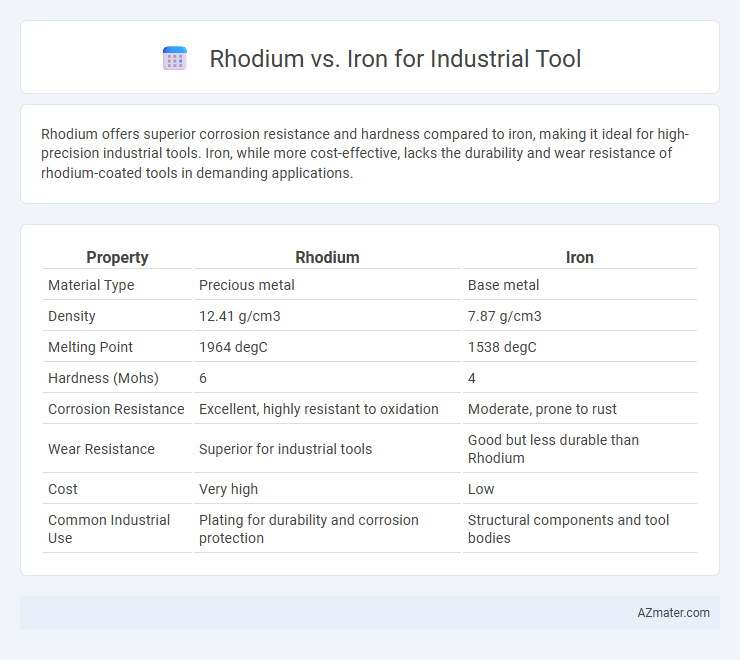Rhodium offers superior corrosion resistance and hardness compared to iron, making it ideal for high-precision industrial tools. Iron, while more cost-effective, lacks the durability and wear resistance of rhodium-coated tools in demanding applications.
Table of Comparison
| Property | Rhodium | Iron |
|---|---|---|
| Material Type | Precious metal | Base metal |
| Density | 12.41 g/cm3 | 7.87 g/cm3 |
| Melting Point | 1964 degC | 1538 degC |
| Hardness (Mohs) | 6 | 4 |
| Corrosion Resistance | Excellent, highly resistant to oxidation | Moderate, prone to rust |
| Wear Resistance | Superior for industrial tools | Good but less durable than Rhodium |
| Cost | Very high | Low |
| Common Industrial Use | Plating for durability and corrosion protection | Structural components and tool bodies |
Introduction to Rhodium and Iron in Industrial Tools
Rhodium excels in industrial tool applications due to its exceptional hardness, corrosion resistance, and reflective properties, making it ideal for precision coatings and high-performance cutting edges. Iron, a fundamental component in steel alloys, offers strength, durability, and cost-efficiency, widely utilized in industrial tool manufacturing for structural support and wear resistance. Comparing Rhodium and Iron highlights Rhodium's niche use in specialized tool coatings versus Iron's broad application in core tool materials.
Chemical and Physical Properties Comparison
Rhodium exhibits exceptional corrosion resistance and a high melting point of 1964degC, making it ideal for industrial tools requiring durability in harsh chemical environments. Iron, with a melting point of 1538degC, offers superior magnetic properties and mechanical strength but is prone to oxidation and rust without protective coatings. The chemical inertness of rhodium combined with its hardness (6 on Mohs scale) contrasts with iron's susceptibility to corrosion despite its tensile strength, influencing tool longevity and maintenance costs.
Strength and Durability Analysis
Rhodium exhibits exceptional hardness and corrosion resistance, making it highly durable for specialized industrial tools exposed to extreme environments. Iron, while more cost-effective and widely used, offers moderate strength but requires alloying for enhanced durability in heavy-duty applications. The superior abrasion resistance and longevity of rhodium-plated tools position them as premium options where sustained performance under harsh conditions is critical.
Corrosion and Oxidation Resistance
Rhodium offers superior corrosion and oxidation resistance compared to iron, making it highly effective for industrial tools exposed to harsh environments. Unlike iron, which readily forms rust when exposed to moisture and oxygen, rhodium maintains its integrity by forming a stable, inert surface that prevents degradation. This enhanced durability reduces maintenance needs and extends the lifespan of tools used in corrosive or high-temperature industrial applications.
Cost and Economic Considerations
Rhodium offers exceptional hardness and corrosion resistance, significantly enhancing the durability of industrial tools but at a substantially higher cost compared to iron. Iron, while more affordable and widely available, typically requires additional coatings or treatments to match the longevity of rhodium-coated tools, influencing maintenance expenses. The economic trade-off favors rhodium for high-precision, low-volume applications where tool longevity reduces downtime, whereas iron remains cost-effective for mass production with routine tool replacement.
Industrial Applications of Rhodium Tools
Rhodium tools offer exceptional hardness and corrosion resistance, making them ideal for high-precision machining and cutting applications in aerospace and automotive industries. Unlike iron tools, rhodium maintains its sharpness and structural integrity under extreme temperatures, enhancing durability and performance in industrial environments. Its superior reflective properties also reduce heat absorption during metal forming processes, improving tool lifespan and efficiency.
Industrial Applications of Iron Tools
Iron tools dominate industrial applications due to their unmatched strength, durability, and cost-effectiveness, making them ideal for heavy-duty tasks such as construction, manufacturing, and machinery maintenance. Unlike rhodium, which is primarily valued for its corrosion resistance and catalytic properties in niche applications, iron provides superior performance in cutting, shaping, and fastening tools essential for large-scale industrial operations. The widespread availability and ease of alloying iron further enhance its versatility and reliability in producing industrial-grade hand tools, drill bits, and agricultural equipment.
Performance in High-Temperature Environments
Rhodium outperforms iron in industrial tools exposed to high-temperature environments due to its superior resistance to oxidation and corrosion, maintaining structural integrity at temperatures exceeding 1,000degC. Iron alloys, while cost-effective, often suffer from scaling and degradation above 600degC, limiting their efficiency and lifespan in extreme heat applications. The inherent durability and thermal stability of rhodium make it a preferred material choice for high-precision, long-lasting industrial tools operating under intense thermal stress.
Environmental Impact and Sustainability
Rhodium offers superior corrosion resistance and durability compared to iron, reducing the need for frequent replacements and minimizing environmental waste in industrial tools. Iron production involves higher carbon emissions and energy consumption due to its reliance on traditional mining and smelting processes, whereas rhodium, though rarer and more energy-intensive to extract, supports longer tool lifespans that contribute to sustainability. Both metals require recycling efforts, but rhodium's high value promotes efficient reuse, reducing ecological footprints in industrial applications.
Choosing the Right Metal for Industrial Tooling
Rhodium offers superior corrosion resistance and hardness compared to iron, making it ideal for precision industrial tools exposed to harsh environments. Iron, while more economical and widely available, lacks the durability and wear resistance required for high-performance tooling applications. Selecting rhodium for industrial tooling ensures enhanced longevity and reliability, particularly in demanding manufacturing settings where tool integrity directly impacts productivity.

Infographic: Rhodium vs Iron for Industrial Tool
 azmater.com
azmater.com